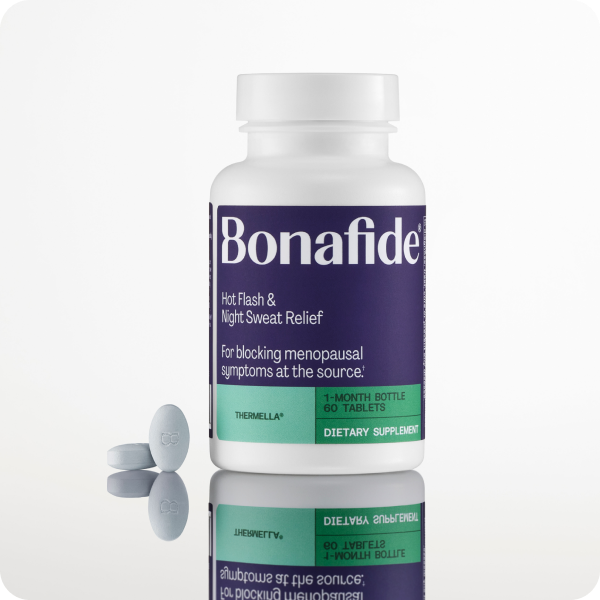If you’re finding that hot flashes are making it difficult for you to keep your cool, you're not alone. Around 35% to 50% of perimenopausal women, and 75% of menopausal women experience them during the menopause transition.1,2 Since hot flashes are certainly not an uncommon symptom later in life, you may wonder whether you should just put up with the discomfort and disruption they bring or talk to your healthcare provider about addressing them.
While many women experience hot flashes, here we'll help you understand why it's a good idea to speak with your provider sooner rather than later about this frustrating symptom set, so you can feel more like yourself again.
Hot Flash Symptoms
Hot flashes can feel different for every woman. They may be so mild that you're unsure whether they're happening or so intense that they disrupt your normal, daily activities.3 They can also happen at any time, night or day, and may vary in length and frequency.
Some of the most common hot flash symptoms include:4,5,6
- Sudden feelings of warmth, especially in your face, neck, and chest
- Flushed or red, blotchy skin
- Rapid heartbeat
- Heart palpitations
- Dizziness
- Sweating, especially on your upper body
- Feelings of anxiety
- Chills at the end of the hot flash
Understanding the Triggers of Hot Flashes
Understanding some of the common triggers of hot flashes can help you adjust your behavior so you can potentially experience these symptoms less often. Some common triggers of hot flashes may include:7,8,9
- Hot or warm environments. You might get a hot flash when you’re out in the sun for prolonged periods of time, during an intense gym session, or if you’re sleeping with a heavy blanket, for example.
- Spicy foods. You may find limiting foods containing spicy ingredients, like chili and pepper, helps to reduce your hot flashes.
- Dietary choices. Large meals as well as foods with high sugar content can contribute to hot flashes.
- Alcohol. Cutting back on cocktails and other boozy beverages is another way to minimize hot flashes.
- Caffeine. As caffeinated beverages, like coffee and cola, can act as a trigger for hot flashes, you may want to try limiting your intake, switching to decaf in the morning or drinking sparkling water vs. sodas during the day.
- Tight or heavy clothes. These types of garments can trap heat near your body and make it more difficult to regulate your temperature. You should also consider the fabrics you wear as some may trap heat and moisture.
- Stress. The rush of adrenaline and cortisol that comes when you feel stressed can trigger a hot flash, so it’s best to try and keep your cool and ease stress as much as possible.
- Smoking. Smoking constricts your blood vessels increasing your blood pressure, which may bring on a hot flash.
If you can identify some of your habits that seem to be contributing to your hot flashes, a healthcare professional may be able to support you in changing them. For example, they might refer you to a counselor to help manage your stress or suggest helpful tools to enable you to quit smoking.
Potential Hot Flash Complications
Hot flashes may seem like just another inevitable annoyance during menopause, but they may also contribute to other health complications. Hot flashes at night, known as night sweats, can cause long-term sleep disruptions.10 Disturbed sleep can have wide-ranging health implications, such as increasing your risk of diabetes, high blood pressure, and anxious/depressed moods.112
While researchers aren’t sure why, women who have hot flashes may also have a greater risk of heart disease.12 Additionally early research hypothesized there may also be a tie to experiencing severe hot flashes during menopause and women with lower bone-mineral density and more hip fractures than their peers who transitioned through menopause without experiencing the symptom.13 More research, however needs to be completed in this area to fully validate this correlation as there has been some conflicting evidence indicating the contrary.14 Your healthcare provider can monitor your health to help detect and manage any of these potential complications if they occur.
What Healthcare Provider Do You See for Menopause Symptoms?
The best healthcare provider to see during menopause and perimenopause is usually your general provider15, or gynecologist. As they understand your medical history, they can usually offer continuity of care. You may find that you feel more comfortable discussing sensitive issues related to your menopause experience with them rather than with someone new. Alternatively, they can also refer you to specialists for extra support or even suggest a Certified Menopause Provider.
If you feel you can manage your hot flashes on your own, by avoiding your triggers, for example, you may not need to seek advice from a healthcare provider specifically for this issue. However, you may decide you want to speak to your doctor or practitioner about night sweats or if your hot flashes are impacting your quality of life. They can suggest personalized solutions for minimizing your symptoms and improving your comfort and well-being during your perimenopause and menopause journey.
Partnering with a healthcare provider throughout your transition can also help you feel confident that any symptoms or associated issues will be detected and managed early-on to provide you with the best outcomes.
Resources
- https://www.health.harvard.edu/womens-health/perimenopause-rocky-road-to-menopause
- https://www.hopkinsmedicine.org/health/conditions-and-diseases/introduction-to-menopause
- https://www.mayoclinic.org/diseases-conditions/hot-flashes/symptoms-causes/syc-20352790
- https://www.mayoclinic.org/diseases-conditions/hot-flashes/symptoms-causes/syc-20352790
- https://www.hopkinsmedicine.org/health/conditions-and-diseases/introduction-to-menopause
- https://www.mayoclinic.org/diseases-conditions/hot-flashes/symptoms-causes/syc-20352790
- https://my.clevelandclinic.org/health/articles/15223-hot-flashes
- https://www.everydayhealth.com/womens-health/menopause/11-surprising-hot-flash-triggers/
- https://www.ncbi.nlm.nih.gov/pmc/articles/PMC2673540/
- https://www.mayoclinic.org/diseases-conditions/hot-flashes/symptoms-causes/syc-20352790
- https://www.ncbi.nlm.nih.gov/pmc/articles/PMC5449130/
- https://newsnetwork.mayoclinic.org/discussion/mayo-clinic-q-and-a-hot-flashes-and-heart-disease/
- https://www.buffalo.edu/imsd/about-imsd/the-buffalo-niagara-region.host.html/content/shared/university/news/ub-reporter-articles/stories/2015/01/hot_flashes_bone_health.detail.html
- https://www.liebertpub.com/doi/10.1089/15246090050073585
- https://www.health.nsw.gov.au/women/Pages/menopause.aspx










